

Tao Te Ching
Search Sages
Enter all or part of an sage's name or biography in the fields below, then press tab or enter to filter the list of Authors. Click the headings Name or Biography to sort by that column. Diacritics are ignored when searching.
Click on the author's name to go to their page.
| Author Name | Biography |
|---|---|
| Sojourner Truth | 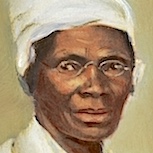 Sojourner Truth Sojourner TruthBorn into slavery and now listed in the “100 Most Significant Americans of All Time,” Sojourner escaped with her infant daughter, went to court trying to get her son back and became the first black woman to win a case like this. She traveled extensively promoting the abolition of slavery, helped recruit black troops during the Civil War and tried to get land grants for freed slaves after the war. A powerful women's rights activist and friend of Susan B. Anthony, she gave one of the most famous speeches on women's rights and is considered a saint by both the Episcopal and Lutheran churches. |
| Socrates | 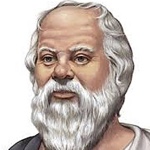 Socrates SocratesOne of the most powerful influences on Western Civilization A founder of Western philosophy, Socrates’ immense influence, methods and insight challenged conventions and encouraged a simple way of life. His lineage continued through Plato, Aristotle, Alexander the Great and some of his other students began important schools of philosophy like Cynicism and Stoicism. Famous for developing the Socratic Method still used today and which could be considered a way of moving from understanding the words to understanding the sense; Socrates became a profound influence on the Roman empire, medieval Europe, the Islamic and Judaic Middle East, the Renaissance and the Age of Reason in Europe. Through more modern philosophers like Locke, Hobbes, and Voltaire; Socrates stays with us today. |
| Sir Leslie Stephen | 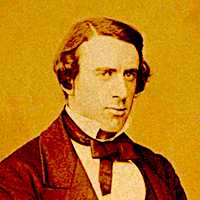 Sir Leslie Stephen Sir Leslie StephenHistorian and father of Virginia Woolf |
| Sir Charles Norton Eliot | 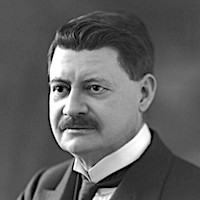 Sir Charles Norton Eliot Sir Charles Norton EliotBotanist, Commissioner of British East Africa, marine biologist, and Ambassador to Japan |
| Simon Sinek | 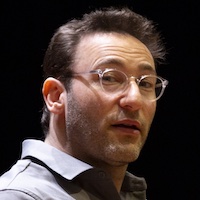 Simon Sinek Simon SinekAuthor of 5 books, motivational speaker, and highly respected business consultant; one of his TED talks became one of YouTube's all time most popular and his books have won best-selling status on both Wall Street Journal and The New York Times lists. Highly critical of the "trickle down" economic theory, he promotes instead the creation of safe, supporting, fulfilling, and inspiring work environments. His childhood in South Africa, London and Hong Kong gave him a more realistic, global perspective that easily goes far beyond the more narrow and nationalistic understandings of most usa-based business consultants. |
| Simon Bolivar | 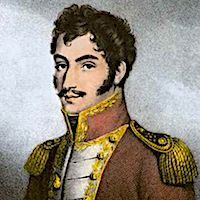 Simon Bolivar Simon BolivarEl Libertador Major image in Latin American identity, military strategy genius, and liberator from Spanish rule of Venezuela, Bolivia, Colombia, Ecuador, Peru, and Panama; Simón Bolívar became the major hero in the 19th century South American independence movements. Inspired by the idealism of the American and French Revolutions, he fought against factions, created foundations for democracy in Latin America, envisioned and worked toward a kind of United States of South America. These efforts however mainly failed, countries devolved into dictatorships, and Bolivar was almost assassinated. He described these attempts at union a failure and only “plowing the sea.” On the other hand, his legacy remains strong with major monuments to him in the capital cities of Lima, Buenos Aires, Havana, México City, Panama City, Paramaribo, San José, Santo Domingo, Sucre, Algiers, Ankara, Bucharest, London, Minsk, Moscow, New Delhi, Ottawa, Paris, Prague, Port-au-Prince, Rome, Tehran, Vienna, and Washington DC. |
| Sima Qian | 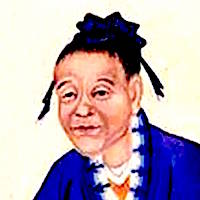 Sima Qian Sima QianFather of Chinese historians Father of Chinese historians, Court Astrologer, and and for centuries considered author of the greatest history book ever written; Sima Qian—although imprisoned, castrated, and enslaved—managed to write a monumental and innovative history of China including a series of biographies that went back more than 2000 years. His writings and writing style had a deep influence on Chinese, Korean, Japanese, and Vietnamese cultures. Sorting through myth and imagination, he went beyond the tradition of only writing about the emperors and generals, used more than 75 books to cross-check for accuracy, refused to include information he couldn’t verify, and traveled extensively interviewing people about their personal experience of events. He wrote the earliest known biography of Lao Tzu. |
| Sima Guang | 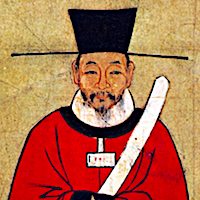 Sima Guang Sima Guang"Greatest of all Chinese historians” “The greatest of all Chinese historians,” politician, scholar-official, and major cat-breeder; Sima Guang opposed Wang Anshi's reforms to help the poor against the rich but wrote a pioneering, universal history of China that influenced the world’s political evolution. Also a lexicographer, he spent decades writing his time’s most comprehensive dictionary that included 31,319 Chinese characters. His book, Family Precepts (司馬溫公家訓) became a powerful influence on both Chinese and Japanese culture. A genius with a monumental memory, Sima’s quick thinking when he was only 7 famously saved the life of his friend. He loved reading "to the point of not recognizing hunger, thirst, coldness or heat” and when involved with a complicated writing project, he slept on a wooden log so he would sleep less and be able to work more. His scholarship—far from just intellectual speculation—became a guiding force for emperors but during his life and after his death. |
| Sigmund Freud | 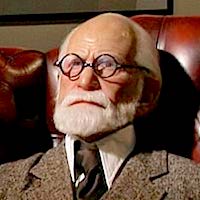 Sigmund Freud Sigmund Freud Dismissed and laughed at because of his more outlandish theories, it’s too easy to overlook Freud’s many deep insights. Founder of psychoanalysis and inspiration/influence for many of the important psychologists who came after him including Jung, Adler, Erich Fromm, Wilhelm Reich, and Fritz Perls; he developed many techniques and understandings for treating mental illness—ideas like free association, transference, the Oedipus complex, repression, libido, a theory of the unconscious, and an id-ego-super-ego psychic structure. Fromm—though critical in many ways—described Freud (along with Marx, and Einstein) as an "architect of the modern age,” believed he permanently changed the way we understand human nature, but thought psychoanalysis quickly became corrupted. Although such a famous name today, during his lifetime Freud shared some of the obscurity common to most history-changing people. His influential book, The Interpretation of Dreams (1900) only sold 351 copies during the first 6 years after publication. |
| Shyalipa | 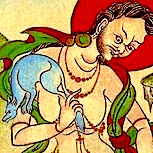 Shyalipa ShyalipaMahasiddha #21 A poor laborer terrified of jackals but living on the edge of a cremation ground full of jackals, Shyalipa became so terrified he couldn’t sleep at night and only a little during the day when he dreamed about jackals. Kind to a wondering teacher who gave him a practice called “the fear that destroys fear,” he learned to meditate on the jackal howls until he could recognize the indivisibility of emptiness and sound, the complete appreciation of his self-liberated fear. Rather than running away from his terror or trying to get rid of it, he leveraged overcoming his fear of jackals to overcoming his fear of death and the suffering of life, he “destroyed his fear with fear,” and wearing a jackal skin became an important teacher himself. Mahasiddha #21 |
| Shunryu Suzuki Roshi | 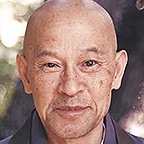 Shunryu Suzuki Roshi Shunryu Suzuki RoshiIn completely in harmony with Lao Tzu, Suzuki Roshi’s teachings, possibly more than almost anyone else – and without saying so – brought a clear understanding of the Tao Te Ching into our modern world. In Japan, he had to deal with the rigidity and aggressiveness of his war time country. He came to San Francisco in 1959 and flourished during the height of the counter-culture influencing poets, artists, religious leaders (like Alan Watts and Chogyam Trungpa), and founded the first Zen Buddhist monastery in the West. |
| Shennong | 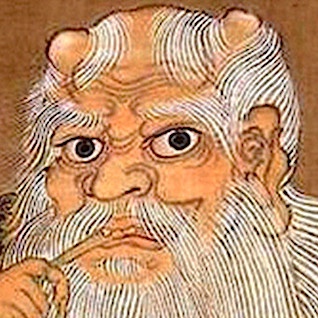 Shennong Shennong“Father of Agriculture” and Traditional Chinese medicine “Father of Agriculture” and irrigation; inventor of the plow, axe, rake, digging wells, preserving seeds, cultivating grain and the farmer’s market; Chinese history also credits Shen Nung with developing science and the use of herbs for medicine, moxibustion, taking pulses, and acupuncture. Said to have discovered tea, he is also quoted in the I Ching and the Huainanzi. Wandering through remote mountains and plains, he identified and then cultivated rice, wheat and millet; tasted and tested hundreds of herbs, developed the first pharmacopoeia and Traditional Chinese medicine. |
| Shen Kuo |  Shen Kuo Shen KuoGreatest scientist of his age, statesman, inventor, poet, finance minister, horticulturalist, engineer, art critic, diplomat, military general, musician, and commentator on ancient Daoist texts; Shen Kuo discovered the magnetic compass needle and the concept of true north which revolutionized navigation 400 years before known in Europe, popularized Bi Sheng’s invention of moveable type 400 years before Gutenberg, researched and described climate change, made the first raised-relief map, described UFOs and beneficial insects, re-discovered an ancient Chinese surveying tool unknown in Europe until 1321. Politically aligned to Wang Anshi, he was impeached, exiled and spent his older years with the "nine guests" — playing music, weiqi (Go), Chan meditation, painting, tea, alchemy, poetry, conversation and wine. |
| Shechen Gyaltsap | 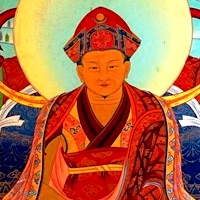 Shechen Gyaltsap Shechen GyaltsapDilgo Khyentse Rinpoche's main teacher Famous Nyingma Dzogchen master and one of Jamgön Mipham’s closest disciples, Shechen Gyaltsap was Dilgo Khyentse Rinpoche's guru and through him had a profound influence on Tibetan Buddhism's migration to the West. |
| Shantipa |  Shantipa ShantipaMahasiddha #12 “Keeper of the Southern Gate,” student of Naropa, teacher of Atisa, and an academic famous throughout ancient India; Shantipa was invited by the king of Sri Lanka to teach his people. He visited the island with 2000 monks and big baskets of Dharma texts carried by horses and oxen. Welcomed by the people with joy, openness, and excitement, he taught the Buddhist teachings for 3 years and received immense and valuable gifts, honor and fame. Returning to India he met one of his earlier disciples, Kotalipa who had become a Mahasiddha himself. This made Shantipa realize that he was seduced the words of his own teachings and had missed the sense. He became a disciple of his disciple, began his practice again at a very old age, and eventually realized the sense beneath the words he had expounded for so many decades. |
| Shantideva | 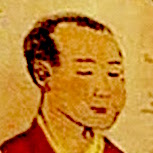 Shantideva ShantidevaSon of a king, Indian scientist, Buddhist monk, "The Great Poet," and unliked Nalanda University scholar known for not studying, practicing meditation or showing up for events; Shantideva was challenged by the university to give a talk as proof that he really belonged there but really as way of getting rid of him. Shocking the scholars and monks who wanted to expel him, he gave a talk that became the famous Bodhicaryavatara, The Way of the Bodhisattva or Entering the Path of Enlightenment. Leaving the University and following Nagarjuna’s Madhyamaka philosophy, his teachings became a strong foundation for the Mahayana tradition. Mahasiddha #41 |
| Shannon Giovannone |  Shannon Giovannone Shannon Giovannone |
| Shan Dao | 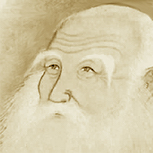 Shan Dao Shan DaoTranslator, entrepreneur, farmer, engineer, inventor, house-holder, and single father; Shan Dao grew up in a remote but culturally diverse village. Alienated from the materialism and militarism of his environment, he was drawn toward a spiritual path and at 4 years old began experiencing at first a mystical Christianity and later one more in harmony with Doestoevesky and Teilhard de Chardin. He practiced at first Rinzai and later Soto Zen, Tibetan Vajrayana Buddhism, and a Rimé Shambhala tradition which led to an immersion in the Tao Te Ching and the deep wisdom streams hidden but flowing in our many different religious cultures. |
| Shabkar Tsokdruk Rangdrol | 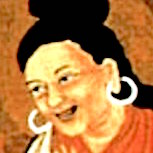 Shabkar Tsokdruk Rangdrol Shabkar Tsokdruk RangdrolProlific writer said to have written over 300 pages per day, famous lama, and student of the Mongolian king Chögyal Ngakgi Wangpo; Shabkar literally means “white feet,” a name given to him because his presence was so inspiration that it wherever he placed his feet became full of virtue and realization. Considered a reincarnation of Milarepa, he spent most of his life in retreats and composed “an ocean of songs.” |
| Seungsahn |  Seungsahn SeungsahnLaundromat repairman, 78th Korean Zen Patriarch, ”Great Lineage Master,” Korean army captain, founder of the international Kwan Um School of Zen; Seungsahn founded many Zen centers in the USA, in Israel, and—with Mikhail Gorbachev’s invitation—one also in the Soviet Union. A member of the underground resistance during the Japanese occupation of Japan, he was caught, imprisoned and almost executed. This led to a 100 day retreat living on a diet of pine needles and rain water and his transition to dharma teaching. Teaching in the West without attachment to a particular form or school, he taught the appreciation of “don’t-know mind” and improvised different practices for different students. this improvisation may have gone a little too far though when—still posing as a celibate monk—he had many affairs with female students. When discovered, he did repentance ceremonies making it seem unlikely that these actions were just more teachings. |